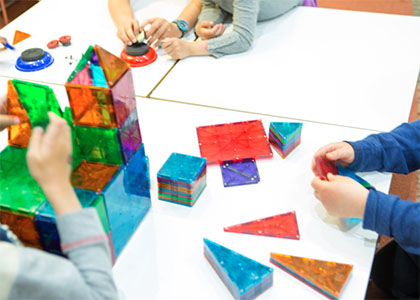Early childhood teachers face challenges when it comes to recognizing, understanding and dealing with trauma in their students.
Here are some useful strategies for educators to begin helping young children and their families overcome trauma.
1. Trauma doesn’t discriminate.
Check your assumptions and biases when it comes to trauma, which may look different for children than for adults. It’s not a given that only children from poor backgrounds experience trauma. Children from wealthy families are not immune to trauma, nor are impoverished children necessarily traumatized.
According to Lesley alumna and Codman Academy Public Charter School teacher Becca Mason, “Often trauma looks different from one child to the next.”
2. Understand the source of trauma.
Trauma comes in all shapes, sizes and levels. It can stem from an offhand comment, physical abuse or a natural disaster. It affects children differently, depending on their stage of development and how adults respond to the trauma. The first step to helping your student is to gently get to the source of the trauma and understand where they are developmentally.
3. Trauma causes us to learn and process information differently.
Trauma can impact the brain’s "fight or flight" response, causing children to remain in a constant, exhausting, heightened state of arousal. Over time, that heightened state becomes the default lens through which children process all information, which inhibits focus, attention and memory.
4. Connect students and families with available resources.
Part of the solution is to avoid assuming caregivers are to blame. They may not understand what is happening to their child, lack access to resources or see behavior from a different cultural vantage point. Engage with a child’s family, help them tap into available resources, including teachers, administrators and clinical psychologists, and connect with psychologists in your school or district so they can establish relationships with and educate teachers and parents. Resources are often limited, so creative solutions for children and their families are key.

5. Create a trauma-sensitive classroom culture.
Children affected by trauma need space to process, so create safe spaces in your classroom for them to do that. Once a student is triggered by trauma, it may take up to 27 minutes to recover, and they need a place where it is OK to do that. Traumatized students may also need tools and manipulatives to help them relax and process their emotions, as well as practical ways to self-soothe and self-regulate. Create a culture of understanding so that other children don’t view this as "special treatment."
"We don’t give all students the same treatment, but everyone gets what they need to succeed. Once children understand that, they won’t perceive a situation as unfair," according to Mason.
6. Consistency is key.
Trauma is unpredictable, and causes feelings of instability and vulnerability. It is therefore critical to give traumatized children predictability, routine and structure. This provides them with necessary boundaries, develops their sense of security, fosters proper responses and helps them understand who they can and should trust.
Young children can overcome trauma and live healthy lives. You are not helpless, and the situation is not hopeless.
Source:
"Trauma-Informed Early Childhood Classroom Practices and Community Relationships" (April 26, 2017). Lesley University Graduate School of Education’s Innovations: Early Childhood Education Workshops, presented by Lesley University Professor of Education Lisa Fiore, director of Lesley’s Child Homelessness Initiative; Lesley alumna Becca Mason, a teacher at the Codman Academy Public Charter School in Dorchester; and clinical psychologist Catherine Koverola, former dean of Lesley’s Graduate School of Arts and Social Sciences and current provost at Cambridge College.
Helpful resources:
Siegel, D.J. (2015). The developing mind: How relationships and the brain interact to shape who we are, 2/e. New York: The Guilford Press.
The National Child Traumatic Stress Network
Lesley Institute for Trauma Sensitivity